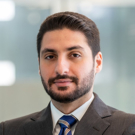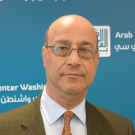Speakers
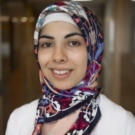
Marsin Alshamary
Research Fellow, Middle East Initiative
Belfer Center for Science and International Affairs
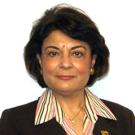
Rend Al-Rahim
Former Iraqi Ambassador to the United States

Shamiran Mako
Assistant Professor of International Relations
Frederick S. Pardee School of Global Studies, Boston University
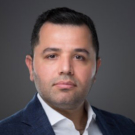
Muhanad Seloom
Assistant Professor in Critical Security Studies
Doha Institute for Graduate Studies
Moderator
About the Webinar
On December 1, Arab Center Washington DC hosted a webinar titled “Iraq at a Crossroads: Challenges and Prospects Facing the New Government.” Panelists were Zeidon Alkinani, Non-resident Fellow at Arab Center Washington DC and Doctoral Researcher and former Teaching Assistant in Politics and International Relations, University of Aberdeen; Rend Al-Rahim, President and Co-founder of the Iraq Foundation and former Iraqi Ambassador to the United States; Marsin Alshamary, Research Fellow in the Middle East Initiative at the Belfer Center for Science and International Affairs, Harvard Kennedy School and Non-resident Fellow at the Center for Middle East Policy, Brookings Institution; Shamiran Mako, Assistant Professor of International Relations at the Frederick S. Pardee School of Global Studies, Boston University; Muhanad Seloom, Assistant Professor in Critical Security Studies at the Doha Institute for Graduate Studies and Honorary Research Fellow at the Institute of Arab and Islamic Studies, University of Exeter. Imad K. Harb, Director of Research and Analysis at Arab Center Washington DC, moderated the event.
Rend Al-Rahim discussed challenges facing new Iraqi Prime Minister Mohammed Shia’ al-Sudani, specifically building popular trust in the state and in the rule of law, building trust between the Shia political class and the country’s Kurdish and Sunni politicians, and maintaining Iraq’s position and relations in the region.
- Regarding power struggles within the political system, Al-Rahim said, “The question is going to arise: Who is in charge? Is it the prime minister and his cabinet reporting to Parliament, or is it the Coordination Framework issuing policies and directives and reporting to no-one, not even to their Kurdish and Sunni partners? This ambiguity is really going to create serious challenges for Mr. al-Sudani.”
- On the role of the United States government, Al-Rahim stated, “The best posture for the US and the best path is to engage with the Sudani government…And this engagement should be within the parameters of a strategic framework agreement. It should not only be about security; it should be about the economy, education, climate, and so on.”
Zeidon Alkinani focused his comments on the significance of domestic elements in shaping the direction of the new government, highlighting differences between the ruling political elite and those who participated in Iraq’s 2019 Tishreen protest movement, as well as members of the public who did not participate, but who have expressed their views in other ways.
- On al-Sudani’s potential to tackle corruption, Alkinani stated, “Prime Minister al-Sudani has long administrative experience in past roles…and he has also addressed corruption directly to director generals of different government entities….Only time will tell us how much he will actually implement and act according to his anti-corruption discourse.”
- On government responses to the 2019 protests, Alkinani said, “Resignations and electoral amendments and early elections were taking place in response to the protests. However, these amendments do not really meet the drastic and overarching popular demands of the very leaderless and diverse forces of the Tishreen protest movement.”
Marsin Alshamary spoke about the significance of Iraq’s Shia religious establishment, while also touching on that of the protest movement and civil society more broadly, as well as on Shia cleric and politician Muqtada al-Sadr’s political movement.
- On the diminished role of Iraq’s religious establishment in governmental affairs, Alshamary said, “Al-Sudani’s government actually faces a different environment than his predecessors, and even his predecessors from Islamist parties, in that there is no degree of intervention from the religious establishment that can be expected. In many ways, they’re in an environment in which they can expect the religious establishment to be more distant and to be less willing to tolerate things from the government.”
- On the entrenchment of Iraq’s political elite, Alshamary stated, “ The political elite will squabble amongst themselves on some issues, but at the end of the day, all of them—including Sadr and including Sadr’s early allies—are united to protect the system that empowers them.”
- On al-Sudani’s ability to create change, Alshamary said, “Al-Sudani may be positioned to enact some small changes that at the end of the day may serve Iraqis and may stem current public opinion that is quite tired of the government and the political system in Iraq since 2003.”
Muhanad Seloom looked at the challenges facing the new government using the lens of security, covering regional and international relations, Turkey and Iran’s military incursions into Iraq, and Iraq’s domestic security structure and situation.
- On the role of the international community, Seloom stated, “If the international community views Iraq through a security lens, the prospects for real economic, educational, [and] cultural support are slim because these countries will and have been focused on selling Iraq weapons and trying to help Iraq fight extremist groups.”
- On al-Sudani’s limited ability to unilaterally enact change, Seloom argued, “Yes, he’s the prime minister. Yes, he has the government. But he’s not the real, or if you like, the main boss here. He has other political parties who have MPs in Parliament, who might actually affect his decisions, even if he wishes to do reforms or to control and unify the security forces in Iraq.”
Shamiran Mako detailed the significance for Iraqi sovereignty of foreign intervention by diverse actors, particularly focusing on Turkish and Iranian military intervention and the 2003 US invasion and subsequent military interventions, which she argued led to fragmentation on multiple levels.
- On the significance of foreign intervention, Mako stated, “This intervention in [Iraq’s] sovereignty…has made it contingent on both regional and international strategic interests….And this has meant that Iraqi elites are not the only arbiters of control, governance, and power….This, in and of itself, raises important questions of how we think about sovereignty in Iraq, and is one of the most pressing and challenging issues to tackle for the new prime minister.”
- On the US role going forward, Mako said, “There needs to be this kind of collective shift in what the US prioritizes, in the way in which it starts to rethink social capacity building, economic reforms, and bolstering national unity as important mechanisms for strengthening long-term strategic outcomes, because these things inherently mean that they will also strengthen Iraq’s domestic stability and sovereign control.”
Featured image credit: Facebook/Iraqi Government

